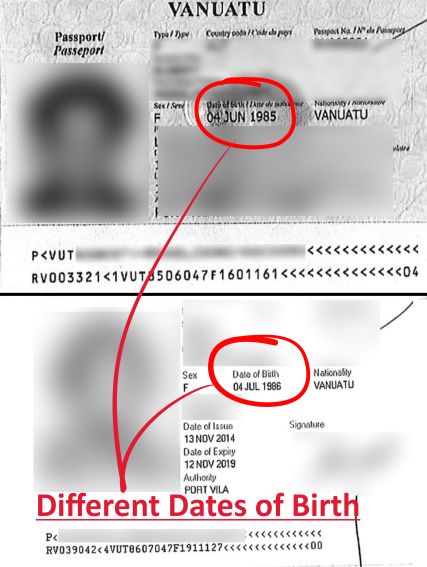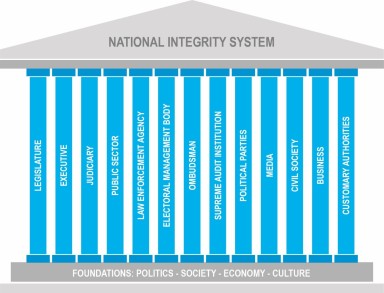WHEN MRS. TOM (not her real name) traveled out of Vanuatu, without her husband’s knowledge, on 28 November 2014 to Fiji her genuine active passport was lying in a safety storage at her husband’s workplace. And when Mr. Tom (not his real name) could not find his wife, he followed up on some suspicious activities that he had encountered. He later found out that his wife had ‘illegally’, as he put it, traveled to Fiji (She is originally from Fiji). Also, further investigations revealed the existence of a second active passport under the same name but with two different dates of birth; a year and a month apart.

Copies of the first and second active passport.
In Mr. Tom’s investigations he discovered that her travelling was assisted by several public servants. Mr. Tom, who works for a government statutory body in Vanuatu, was left to look after their two little children of six years old and a baby who was just four months old.
His story is one of a kind, it involves allegations of fraud, abuse of power, misuse of public assets for sexual desires and ‘hijackings’, all of which were allegedly instigated by a high level public servant who, due to the sensitivity of the matter and ongoing investigations, we shall call Mr. Carl. This Mr. Carl is a prominent public figure, he served as the head of one of Vanuatu’s most handy departments.
Mr. Tom entered the Transparency International Vanuatu office on a quiet evening. He did not say much, instead he had in his hand a packed yellow A3 size envelope. He placed it down on the front desk, “this is for you” he said. He looked neither concerned nor angry, he looked tired, and with a tired smile he shut the door behind him.
Inside the yellow envelop there were copies of three different letters all addressed to three different people; The Prime Minister, the Public Service Commission Acting Chairman, and the Fraud Department. Another separate file of papers contained neatly structured and explained evidences to support his three letters.
Mr. Tom had been doing some investigations on his own, in the case documents he identified a police officer, an immigration officer and other individuals who he states were accomplices to and controlled by a “very cunning individual”. This people, he states, arranged for his wife to travel out of the country using a fake passport.
Mr. Tom and his wife had been married for ten years. About a year ago, she began having an affair with Mr. Carl. In his letter to the Prime Minister Mr. Tom reported that Mr. Carl “had been using a Vanuatu Government Official White G Plate Car…during Vanuatu Official Working Hours, between 7:30 AM – 4:30 PM, to do runs related to unofficial and non-productive, waste of resources, fuel, valuable time, abuse of public assets for personal gains”. Mr. Tom stated that Mr. Carl used this vehicle “as a means to accomplish one mission, which is to fulfil the immoral sexual affairs.”
Since this case came to light Transparency International Vanuatu has been told that Mr. Carl has been suspended from his public service position, and the Public Service Commission have responded to Mr. Tom that the Prime Minister will need to deliberate on the next decision.
The details on the case documents raises eyebrows, one thing for sure was that when the affair developed it triggered a list of suspicious activities. First of all, Mr. Tom was visited at his workplace by an immigration officer and a police officer who was in civilian uniform on November 13 2014. The officers asked to see his wife’s passport, Mr. Tom refused to show it to them as he was suspicious of their demands.
Later, when Mr. Tom visited the authorities’ concerned to investigate on the suspicious visit, he was told that those officers were not supposed to go around demanding to see passports.
Interestingly, on that same date (13 November) when he was visited by the officers, Mr. Tom did not know that his wife was being issued with another active passport. He found out about this a few weeks later. After examining carefully the details on a copy of the second active passport, Mr. Tom found some differences to his wife’s original passport.
From this case, it is evident that the misuse of public assets including public positions is being misappropriated for personal gains, which is in other words an act of corruption.
According to the Leadership Code ‘Leaders shall not use their offices for personal gain or enter into any transaction or engage in any enterprise or activity that might give rise to doubt in the public mind as to whether he or she is carrying out or has carried out the duty imposed by law’. Any leader who breaches the Leadership Code is subject to investigations, and prosecuted if found guilty by the courts.
Mr. Tom came to Transparency International Vanuatu as a victim with his family, he agreed for us to share his story,
“I want my story to go out, some people out there may be facing the same situation” he said, some people out there may be facing the same situation but are not able to do anything. Maybe if he did something about the situation, it will help them somehow, Mr. Tom said.
Today he lives at his home with his children who do not know where their mother is. All he knows, from what he told TIV, is that a public servant and his accomplices took away his wife, they sneaked her out of the country without his concern using a passport that, though it contained some wrong information, was not detected.
The case has been lodged with the Advocacy and Legal Advice Centre (ALAC) for further follow ups. ALAC was established in 2009 by Transparency International Vanuatu, with the purpose of helping people by providing free and confidential legal advice to witnesses and victims of corruption. Email: alacvanuatu@vanuatu.com.vu, Tel: 29008.







